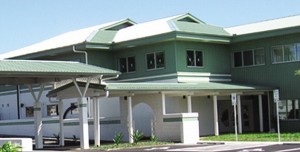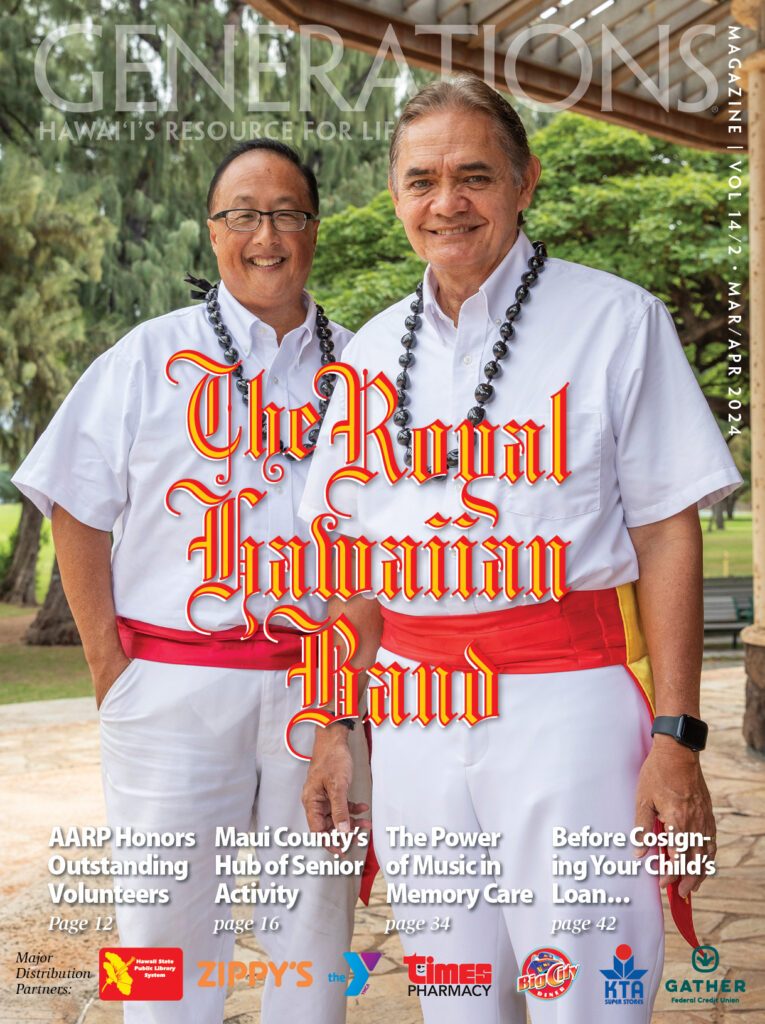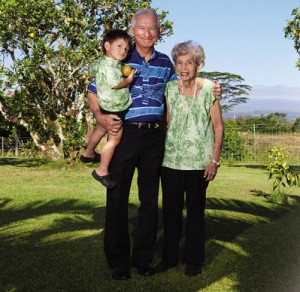
Alan Parker with his hanai mother, Rita Branco, and grandson, Kyan Ray Keaka Parker
HCOA has a simple process for delivering services to the elderly: when seniors voice a problem, Alan and his staff listen. That’s it. Hawai‘i Island citizens start their own grassroots initiatives and mobilize resources to solve it. “Actually, we don’t create programs,” says Parker. “Seniors and the community come up with their own ideas. My six community planners listen and support them with good business planning.” The results of this simple strategy are astounding. Statewide Caregiver Resource Centers (CRC), Community Planning Councils on Aging, Community Voices Programs and Aging and Disability Resource Centers (ADRC) all started on the Big Island.
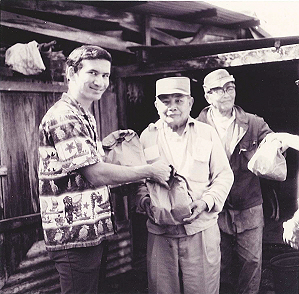
Younger Alan on his first outreach assignment in the rural plantation towns.
Sound too easy? This humble man at the helm of HCOA practices what he calls “plantation values,” and recites lessons his own mentors taught him a generation ago: watch, listen, be quiet and work hard. Parker, highly respected by his peers and employees and adored by elderly clients, has quietly and diligently translated his parents’ values into a system that works. His staff and a large network of county social service programs are passing on this same elder wisdom to a new generation. HCOA is a living network of public and private organizations, profit and non-profit entities that respect one another’s strengths and limitations. They work together to aid and protect their elders.
Strength In Collaboration
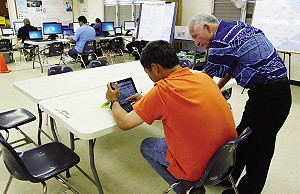
Problem 1: Elderly living alone in rural areas of Puna were at high risk but Hawai‘i County first responders didn’t know how to find them.
While Hurricane Iselle winds were battering Puna, a rural district south of Hilo with a large elderly population, Hawai‘i County Mayor Billy Kenoi called a meeting of all public agencies, including Civil Defense, Office of aging, and United Way with all their agencies. Alan Parker brought his two senior planners, Shelly Ogata and Nic Los Banos.
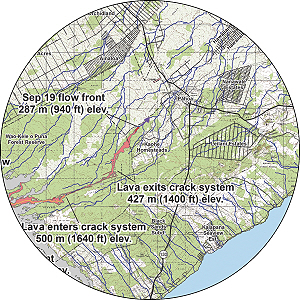
Command Center
Between the “War Room” and the Command Center, both entities assist and monitor the crisis.
HCOA to the rescue — their computer database of some 3,000 seniors became a resource. IT specialist Horace Farr culled out Puna addresses of elders and synched GPS for 320 target homes. The result was a map showing where elderly and disabled residents might be trapped. Hawai‘i County Department of Parks and Recreation, along with many agencies collected emergency supplies, put them in bags and delivered them In the midst of the storm, first response teams with medical and social workers found and delivered aid, food and needed emergency information to 80 isolated seniors. It’s a perfect example of how community-based grassroots efforts work.
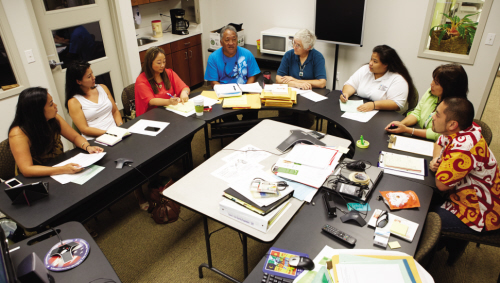
Senior planners, Shelley Ogata (3rd from the left) and Nic Los Banos (far right) meet the team from various departments of HCOA and ADRC to gather in a specifically designed conference room nicknamed the “War Room”.
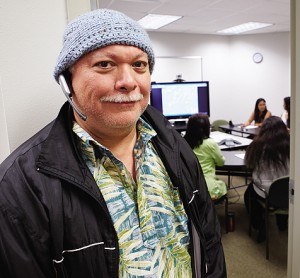
Horace Farr, IT specialist, stands by for instructions.
What was born in a storm is now a Hawai’I Island First Response Coalition. All the agencies mobilized in Iselle formalized outreach procedures so they would be prepared to activate in future disasters. This month the teams are working again, with evacuation plans for Pahoa residents in the path of Kilauea’s latest lava flow. This is the Parker’s “grassroots wisdom” in action.
Alan believes and teaches that Hawai‘i culture has something special, which spans the generations and allows people to work together well. He says, “I got a lot of wisdom from the Plantation Generation: hard work, reliance on family and neighbors, respect for the older generation, and making responsible decisions for future generations. The kupuna in my hanai family taught me these same values.
“I had a wonderful family. As you know, it is a cultural practice to share your kids with other families. When I was a young teen I bought a car with no transmission — a Chevy Impala — and I had no clue how to put in a new transmission. That’s what kids do. My family didn’t have a garage. Our neighbors, The Branco family gave me their garage to work on my car for months until I got enough money and knowledge to fix my car. Can you imagine what a sacrifice they made for a neighborhood kid?
That was 1965. After that the Brancos invited me to every family gathering, as a hanai son. Nurturing other through the family is an old Hawaiian and plantation tradition. That’s just how we work at HCOA.”
Two of Alan’s mentors are George Yoshida, and Derek Kurisu, Hosts of KTA Superstores’ “Seniors Living in Paradise Show” on Oceanic Cable TV. George was the Director of the Elderly Activities Division of Hawai‘i Department of County Parks and Recreation who started Big Island Senior Centers. Derek is Vice President of KTA Superstores and a visionary who has partnered with George and Alan to create public resources like the hosting the TV show, soliciting donors and prizes for the annual Old Americans Luncheon, and editing the HCOA Silver Bulletin. This public/private collaboration is not a campaign promise, but a 30-year reality.
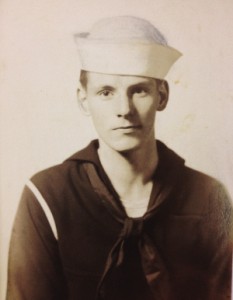 George and Derek promote the values they were all raised with — they call them “plantation values”because a lot of different people groups were forced to work together and get along in plantation camps, housing for workers on large sugar plantations. Kurisu is in demand as an inspirational speaker, promoting these values, and Yoshido creates programs and venues that build on them — he began Kupuna Hula and Senior Softball, which are now statewide and international programs.
George and Derek promote the values they were all raised with — they call them “plantation values”because a lot of different people groups were forced to work together and get along in plantation camps, housing for workers on large sugar plantations. Kurisu is in demand as an inspirational speaker, promoting these values, and Yoshido creates programs and venues that build on them — he began Kupuna Hula and Senior Softball, which are now statewide and international programs.
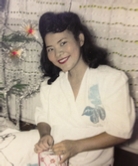
Parents, Virgil Ray and Tsukie Hirai-Parker
Alan Parker holds his mom’s generation in great esteem. “Mom was Japanese. Dad came from Ohio during World War II and joked that he came to fight the Japanese, but ended up being captured by one of them! The leaders of that era were strong and very wise: Mary Matayoshi at Hawai‘i Community College, American Cancer Director Lily Inouye, Patrick Pavao at Veterans Affairs, and office volunteer, Alice Ondigon. I learned so much from all of them.
“I made some mistakes, too,” admits Parker. One time the Department of Parks and Recreation asked him to develop a plan to restore Puna parks destroyed by Kilauea in the 80s. Parker grins. “The Puna folks really hated my plan — shot it down good. Gee, you know I felt bad … but afterwards I called a meeting and asked the people to put together their own plan; I invited the ones who had complained the most. Three months later they laid out a plan they really liked and it was almost exactly what I had proposed! But you know the big difference was that it was their plan. I never forgot that grassroots is number one.”
When Parker joined HCOA in 1974 as Director of Retired and Volunteer Senior Program (RSVP,) his boss was Gladys Bowell, a social worker from New York, who had worked with big national agencies and the National Girl Scouts. “She had impressive experience, but she didn’t come in and tell us what to do; she just fit in to the community, gained trust and listened to everybody. Then she gathered folks from every echelon of the community: unions, plantations, and heads of state agencies, housewives and the mayor, to work on aging problems. And then Gladys kept listening. When they came up with something worth doing, she helped with planning, found donors and grants to support it. That first program was Kona Homemakers Program, which is still successful 40 years later. Gladys was great at getting people to tell her what they need.”
“I got a lot of wisdom from the Plantation Generation: hard work, reliance on family and neighbors, respect for the older generation, and making responsible decisions for future generations.” – Alan Parker
Alan reminisced about mobilizing his first group of RSVP volunteers. “Isami Kobayashi, head of the Papaikou Senior Club, did so much for seniors. We needed RSVP volunteers like retired schoolteachers to help in the schools. His club was big — over 400 retirees — so I asked him to put the word out. He came back and said he was sorry; he wanted all his club members to volunteer, but only 150 signed up! Yikes — I had to scramble to find assignments for all 150 of them! Dorothy Kataoka and Shigeko Chang would take two busloads of volunteers up to Hilo Hospital each week. They were housewives, truck drivers, and plantation field crew, but they found ways to help: landscaping, working in the hospital laundry and in the physical care department doing needlework. It’s different now — government programs dictate what kind of volunteers they want, with this skill or that. At HCOA a desire to help is still top priority. If people want to help, we can find work for them. That’s why our RSVP program is still going strong.”
In 1978 HCOA Director William Takaba brought formal case management and database tracking to HCOA, and it made a big difference in the effectiveness of all the programs. That year Pauline Fukunaga joined the department. Later in 2001, after a two-year assignment at the Parks Department, Alan took over as HCOA Director, and made Pauline his Lead Planner. She will retire early in December 2014.
Seeds Of Values Take Root In The Future
Parker is proud of his current staff and says the young people working at HCOA are remarkable. “I hear people complain about the next generation, but I don’t get it. I see young people with a lot of skills who are serious about helping our seniors. Our Hawai‘i families have passed down their plantation values to the next generation. I am passing them down to my grandchildren.”
Early RSVP volunteer Lily Alicuban, and Derek Kurisu passed on their her community values. Liliy’s grandson Evan and Derek’s son Blake were buddies in Key Club at Waiakea High School and secured grants to install Personal Emergency Response Systems (PERS) in the homes of elderly living alone– light switches that would turn ordinary porch lights into blinking emergency lights. The emergency lights saved lives. Now Evan is Resident Physician at USC School of Medicine. Blake, a New York Marketing Manager, earned his MBA from Harvard.
Within HCOA, Planner Nic Los Banos is an example of a new breed of county employees with business degrees, that Parker mentors. They bring to the job computer skills, and business skills like controlling and marketing, as well as financial accounting and planning.
Hawai‘i County Office on Aging contracts with and has working relations with over 50 agencies and other partners to deliver services to a mix of aging Hawai‘i residents: active and healthy, frail and elderly, disabled and chronically ill. This broad network of services are funneled through an Aging and Disability Resource Center (ADRC) named Kahi Malama (Place of Care) located in Hilo, a one-stop shop where seniors can access all the county programs and resources for aging: caregiver support, case management, counseling, employment information, legal, nutrition, personal care, outreach, respite, transportation, volunteers, elder abuse and neglect, healthy aging, awareness and prevention.
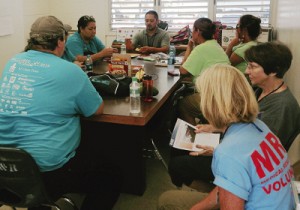 Alan’s small staff of five planners covers a lot of ground by coordinating with their partner organizations. In addition, a host of volunteers allow Hawai‘i County to meet its commitment to the aging through modern communications, shared resources, and a commitment to helping others. Without volunteers, the network could not meet its full mission.
Alan’s small staff of five planners covers a lot of ground by coordinating with their partner organizations. In addition, a host of volunteers allow Hawai‘i County to meet its commitment to the aging through modern communications, shared resources, and a commitment to helping others. Without volunteers, the network could not meet its full mission.
“At HCOA a desire to help is still top priority. If people want to help, we can find work for them. That’s why our RSVP program is still going strong.” – Alan Parker
What’s in store at Hawai‘i County Office of Aging after Alan Parker closes out 40 years and retires at the end of the year?
“I leave a clean slate for the next director,” says Parker. “2015 is the start of a new strategic planning cycle. Since the recession in 2008, federal and state funding has been reduced, and the small HCOA staff has been pulled thin by an increasing number of clients as baby boomers retire. Disaster relief adds to the workload. Nevertheless, HCOA is meeting its mission. We have a marvelous staff, and they get a lot of work done — done well. I think as the economy continues to strengthen, our budgets will get more robust.”
Also retiring after 36 years is Lead Planner, Pauline Fukunaga. “Hawai‘i has the greatest longevity in the nation,” says Pauline. “We also have the fastest growing group of 85+ year-olds in the country. For many years HCOA exclusively served old and frail elderly residents, but now we also have a growing number of active seniors with different needs. We are listening to what they want, and our programs will have to change,” said Fukunaga.
Parker reflected, “Pauline and I have learned that top-down, cookie cutter programs don’t work very well here; they don’t seem to last. But grassroots, community-based programs will continue to be born in Hawai’i County after we step down. My wonderful staff and the generation of workers behind them are skilled listeners, skilled business planners and committed to help Hawai‘i seniors plan and grow solutions to their problems.”
We left the HCOA staff with a good feeling — and a new gratitude for the values that set Hawai‘i apart from all other communities: respect for elders, grassroots wisdom and aloha for all.
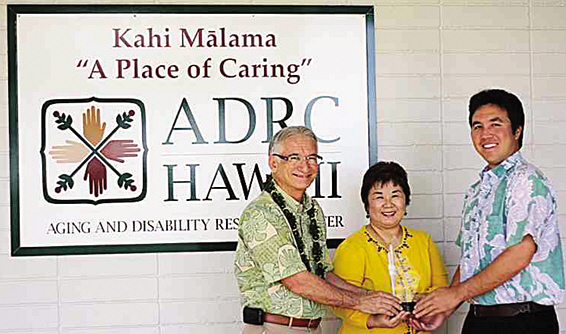
Photo courtesy of County of Hawaii Mayor’s Office In 2010, Alan Parker (left) receives the Excellence in Action Award from the U.S. Administration on Aging, the Centers for Medicare and Medicaid and the Veterans Administration, presented by Audrey Suga-Nakagawa, State ADRC Coordinator and Mark Miranda, the Governor’s Liaison.
